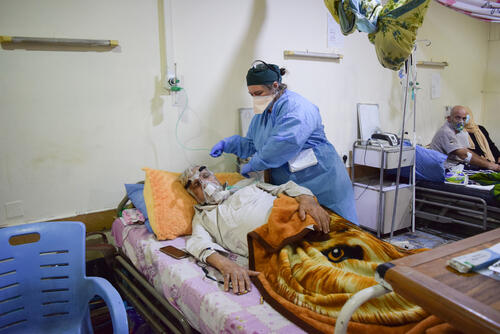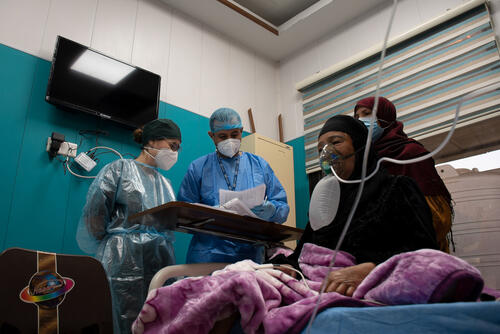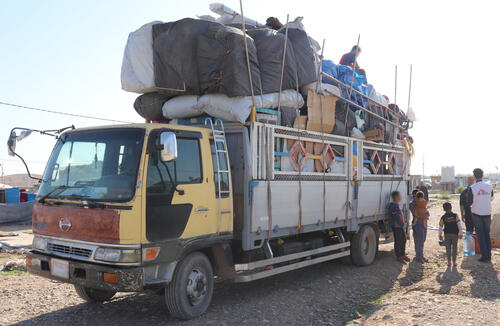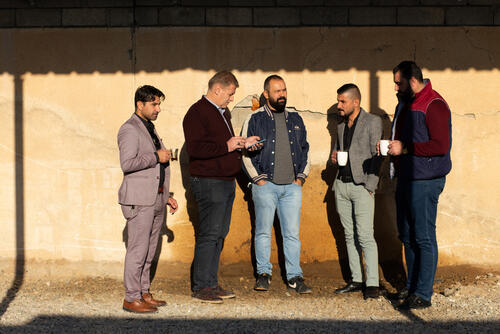The COVID-19 pandemic has become very alarming in Iraq, with the country currently reporting close to 4,000 new cases every day and around 500 deaths a week.
Over the past month alone, more than 100,000 cases have been identified in the country. And on 23 September, 5,055 new COVID-19 cases were confirmed, representing the highest daily rate in the country since the beginning of the pandemic. The Iraqi capital Baghdad is the worst-hit city, with almost 30 per cent of the country’s reported cases .
To respond to the escalating emergency and support local health authorities, Médecins Sans Frontières (MSF) has started working in Al-Kindy hospital in Baghdad. The hospital is receiving large numbers of severe and critical COVID-19 patients.
By the time we have a free bed, patients are in really bad shape.Dr Pedro Serrano Guajardo, intensive care specialist
During the past two months, our teams have been helping in the respiratory care unit (RCU), providing bedside training for staff, including ventilation use, drug use, and techniques adapted for the treatment of COVID-19. Given the high number of patients, we plan to expand our services in Baghdad by opening a new COVID-19 ward in Al-Kindy hospital.
Despite efforts to tackle the virus, the growing number of severe and critical cases has recently overwhelmed Al-Kindy and other health facilities treating people with COVID-19. The RCU in Al-Kindy hospital has 52 beds, all of which are currently full.
“Every moment of every day we’re seeing more and more severe COVID-19 cases in Baghdad,” explains Dr Pedro Serrano Guajardo, a doctor working with MSF as an intensive care unit specialist.
“Many patients stay in the RCU for 15 to 20 days to be treated, meaning that sometimes new patients are put on the waiting list for two, maybe three days, until they can get the treatment they need. By the time we have a free bed, patients are in really bad shape. It is really distressing to watch these people wait for a bed.”
The waiting lists and lack of bed capacity are not the only issues in Baghdad.
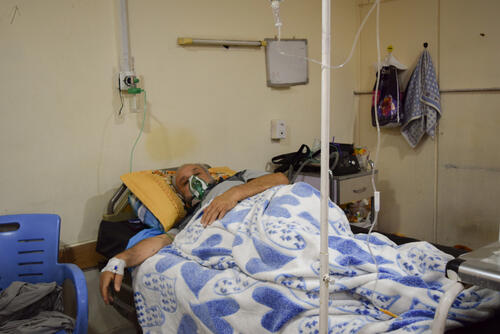
“Some people in the city do not appreciate the gravity of the situation, and they are not taking prevention measures,” says Dr Guajardo. “They are also waiting to come to the hospital when it’s almost too late to seek treatment. We receive cases in acute respiratory distress, and it is very hard to treat them when they reach that point.”
These people seem to be avoiding treatment due to the heavy social stigma associated with COVID-19 in the community.
“I think many people sometimes only realise how bad the situation is when they or a loved one is brought to the hospital. They see patients dying, very quickly, every day. Then they realise the reality [of the situation].”
I know that if people were taking measures to protect themselves – like wearing a mask when they go out and washing their hands, or coming to hospital earlier rather than later – then the situation could improve.Dr Pedro Serrano Guajardo, intensive care specialist
Iraqi health workers have also been very badly affected, with almost 15,000 cases since the start of the outbreak. This comes on top of existing shortages of human resources in several hospitals in Baghdad, further complicating an already critical situation.
“We’re trying to do our best to support the efforts of Iraqi health authorities in tackling the virus in Baghdad, even though our capacity is limited,” says Gwenola Francois, MSF’s head of mission in Iraq.
“Even with the high number of patients we see at the moment, we are not sure where we are on the curve of the epidemic. From what we can see the situation is deeply worrying. We’re currently preparing additional means of support with the health authorities to alleviate the suffering of people in Baghdad.”
“The most stressful thing is to see a patient dying and know that I don’t have an available ventilator for them,” says Dr Guajardo. “When you can see them fade away minute by minute, it is frustrating because I know that if people were taking measures to protect themselves – like wearing a mask when they go out and washing their hands, or coming to hospital earlier rather than later – then the situation could improve.”
MSF is working across Iraq to help the health system cope with the pandemic. In Mosul, soon after COVID-19 reached Iraq, we took the decision to support the city’s healthcare system and temporarily transformed part of our 62-bed post-operative care centre into a COVID-19 treatment facility.
Our teams have been providing training sessions, with a focus on infection prevention control, in various health facilities in Erbil, Dohuk and Ninewa governorates. They have also set up a 20-bed isolation and treatment facility in Laylan camp in Kirkuk governorate, in preparation for a potential surge of COVID-19 cases.



